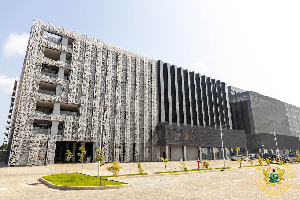The Soil Health Project (SHP) of the Alliance for a Green Revolution in Africa (AGRA) designed to increase productivity of maize-legume cropping systems through scaling up proven Integrated Soil Fertility Management (ISFM) technologies in northern Ghana has ended.
The ISFM is the application of strategies that centre on the combined use of mineral fertilizers and locally available soil amendments such as lime, phosphate rock and organic matter like crop residues, compost and green manure to replenish lost soil nutrients.
The four-year project, which began in 2010, was implemented by the Savanna Agricultural Research Institute (SARI) of the Council for Scientific and Industrial Research (CSIR) in 31 districts in the Northern, Upper East and Upper West Regions.
It adopted a value-chain approach to production, linking farmers to sources of seeds, fertilizers and other agro-inputs, training farmers through farmer field schools and demonstrations, training agro-dealers, helping farmers to access credit and linking them to remunerative markets.
A total of 120,000 farmers were trained on ISFM technologies in the three regions and linked to trained agro-input dealer networks and markets whiles 1,500 videos on ISFM technologies were also produced in seven local languages for the farmers.
The AGRA SHP became necessary in view of the fact that northern Ghana, which is one of the bread-baskets of the country, was producing crops such as maize, rice, soybean, and cowpea at 30 per cent capacity because of poor soil quality.
Speaking at the end of a workshop of the AGRA SHP at Nyankpala, near Tamale, on Tuesday, Dr Mathias Fosu, Principal Research Scientist at SARI-CSIR and Manager of AGRA SHP said it had more than doubled farm yields for beneficiary farmers.
The workshop, which brought together stakeholders and some beneficiaries of the project from the three regions, was to discuss the significant achievements as well as assess the results obtained for improved maize-based cropping system.
Dr Fosu said, “On average, farm households having three hectares with our new approach can make GHc1,600 extra money from their maize farm and there is potential to reach GHc3,000 per household with soybean.”
He stressed that, “The benefit of this project can be seen in the fact that increasing maize yield alone from one tonne per hectare to three tonnes per hectare will bring additional $758 million into Ghanaian economy.”
He expressed hope that with the increasing availability of improved seeds, continuous fertilizer and seed subsidy, and remunerative markets, “We believe that the green revolution can be achieved.”
Mr. Seidu Mumuni, a beneficiary farmer from Tesh-Natinga, a community in the Pusiga District of the Upper East Region said the AGRA SHP had helped to improve his income as he was now realizing improved yields and selling them at remunerative markets.
Mr. William Boakye-Acheampong, Northern Regional Director of Agriculture called for continuous monitoring and education of farmers to continue to apply the knowledge gained from the AGRA SHP to improve agriculture production.
Regional News of Thursday, 27 February 2014
Source: GNA












